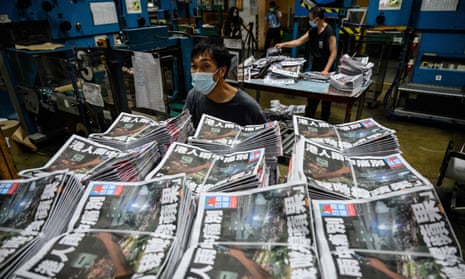Xi Jinping has created a “nightmare” of media oppression worthy of the Mao era, and Hong Kong’s journalism is in “freefall”, according to Reporters Without Borders (RSF).
In a major report released on Wednesday, the journalism advocacy group detailed the worsening treatment of journalists and tightening of control over information in China, adding to an environment in which “freely accessing information has become a crime and to provide information an even greater crime”.
“No matter the topic, those who refuse to comply with the official narrative are accused of harming national unity.”
In the report’s forward, RSF’s secretary general, Christophe Deloire, said before Xi came to power in 2013, there was an emerging trend of improvements in press freedom, but he had “put a brutal end to this partial opening and restored a media culture worthy of the Maoist era”.
“This ‘great leap backwards’ of journalism in China is all the more terrifying given that the regime has immense financial and technological resources to achieve its goals,” Deloire said.
The report listed a growing number of “obstacles” to journalism, including online censorship and surveillance, paid amateur propagandists known as the “50 cent army”, increasing use of detention without trial, Hong Kong’s national security law, forced televised confessions, daily instructions from the Communist party to newsrooms and other platforms, use of allegations ranging from “picking quarrels” to espionage to silence journalists, and the weaponising of exit bans.
As well as advances in surveillance and technology, the report also described a ruling introduced in October 2019 that all Chinese journalists must use a smartphone app called “Study Xi, Strengthen the Country”, which cybersecurity experts had found could enable collection of personal data and remote access to the device’s microphone.
Harassment and intimidation of reporters both local and foreign has markedly increased, according to RSF and the Beijing Foreign Correspondents Club, in particular during coverage of the Henan flood disaster earlier this year. The Henan provincial government put out a tender for a journalist-specific surveillance system after the flooding.
In 2020 at least 18 foreign correspondents from US outlets were expelled, while others were forced to flee, including the BBC’s John Sudworth and Australian reporters Bill Birtles and Mike Smith, who had been investigating the national security arrest of Australian CGTN anchor Cheng Lei. Several citizen journalists were arrested for attempting to report from the Wuhan lockdown, while others have been targeted for their work on #MeToo cases.
Until crackdowns in 2020 and 2021, Hong Kong’s media had been considered free and separate to the mainland’s controls, however RSF said that was no longer the case, and the sector was in “in freefall”.
The report cited the arrest and jailing of journalists and media proprietors such as Apple Daily’s Jimmy Lai, the raiding of newsrooms, wholesale changes at public broadcaster RTHK, and lack of consequences for police violence against reporters.
“The repression no longer spares Hong Kong, once a champion of press freedom, where a growing number of arrests are now conducted in the name of national security,” said Deloire.
The report made several recommendations and appeals to authorities to improve the situation, but also listed detailed advice for journalists to protect themselves and their sources from technological surveillance and intimidation.
It called on global democracies to “identify all appropriate strategies to dissuade the Beijing regime from pursuing its repressive policies and to support all Chinese citizens who love their country and want to defend the right to information”.
